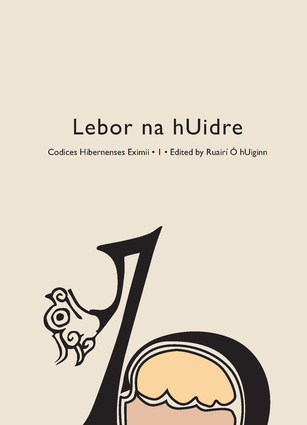Overview
Codices Hibernenses Eximii I: Lebor na hUidre is the first in a series of books dedicated to exploring some of the major manuscripts in the Royal Irish Academy’s collection. Lebor na hUidre (LU) is the oldest manuscript we have that is written entirely in the Irish language. This book represents the proceedings of a conference organised by the library of the Academy and Maynooth University to mark the centenary of one of the most important studies on LU—R.I. Best’s ‘Notes on the script of Lebor na hUidre’, published in the Academy’s journal Ériu in 1912. Speakers at the conference undertook a fresh examination of the history, palaeography, language and background of LU. This resulting book contains much scholarship that is new, and it represents a major landmark in the study of one of the Academy’s greatest treasures.Author Biography
Elizabeth Boyle is Lecturer in Early Irish at Maynooth University. Her primary research interest is the intellectual and religious culture of early medieval Ireland, and she has also published on the history of Celtic Studies in the nineteenth century.Liam Breatnach MRIA is a Senior Professor in the School of Celtic Studies at the Dublin Institute for Advanced Studies, and co-editor of the journal Ériu, published by the Royal Irish Academy. His research interests are in the areas of Old Irish language; Middle Irish and the historical development of Irish; Early Irish law texts; and poets, poetry and metrics.John Carey MRIA is a Professor of Early and Medieval Irish at University College Cork. His research interests include cosmology, apocrypha and vision literature, legendary history, cultural connections between Ireland and Wales, tales of the transmission or recovery of traditional knowledge, and the portrayal of the Irish ‘Otherworld’. He has contributed to Codices Hibernenses Eximii I: Lebor na hUidre (2015) and Treasures of the Royal Irish Academy Library (2009).Elizabeth Duncan’s research interests cover palaeography, codicology and manuscript production in the Celtic world. She was awarded her PhD at the University of Aberdeen in 2010 for her dissertation on the development of Gaelic script in the eleventh and twelfth century.Máire Herbert MRIA is the head of Scoil Léann Na Gaeilge and Professor of Early and Medieval Irish at University College Cork. Her research interests include Irish literary and cultural history of the eleventh and twelfth centuries, early Irish saints’ lives, and Irish-Scottish contacts in the pre-Norman era. She has contributed to Codices Hibernenses Eximii I: Lebor na hUidre (2015) and Treasures of the Royal Irish Academy Library (2009).Donnchadh Ó Corráin MRIA is emeritus Professor of Medieval History at University College Cork. He has published on many aspects of medieval Irish history: genealogy, law, literature, politics, institutions and the Viking wars. His Clavis litterarum Hiberniae will appear shortly.Ruairí Ó hUiginn MRIA is Professor of Modern Irish at Maynooth University and Head of its School of Celtic Studies. He has published on many aspects of Irish language and literature and is currently Chair of the Management and Editorial Committees of the Royal Irish Academy’s Foclóir na Nua-Ghaeilge.Nollaig Ó Muraíle MRIA, was, until his retirement in 2014, senior lecturer in Irish at NUI Galway. He has a particular interest in the Gaelic manuscript tradition, Irish onomastics, and medieval Irish annals and genealogies.Gregory Toner is Professor of Irish at Queen’s University, Belfast. He edited the electronic version of the Royal Irish Academy’s Dictionary of the Irish Language and is working on a revision of the Dictionary. He has written widely on early Irish literature and edited the twelfth-century tale Bruiden Da Choca, which was probably written by a relative of Máel Muire mac Céilechair, one of the scribes of Lebor na hUidre.

